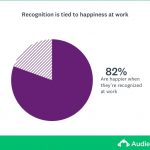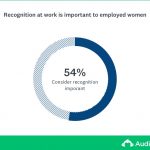There’s a reason that untold generations of parents have cajoled their kids into writing thank you notes after the holidays: feeling appreciated is an important part of human happiness. It’s just as true in the workplace as it is at home.
Employee recognition validates good work. Whether it’s a raise, a public call out, or 1:1 praise from a manager, it resonates. According to our most recent research, workers believe that it plays into their ability to get promoted, their relationship with peers, and their happiness at work. It might even be connected to their willingness to stay with their company.
We partnered with the employee recognition platform Bonusly to ask over 1,500 employed Americans on SurveyMonkey Audience about their impressions of recognition at their company, what it means to them, and how they prefer to be recognized.
Read Bonusly’s sister report about the 5 love languages of employee recognition.

How employee recognition ties to retention
The importance of recognition isn’t lost on workers:
- 68% think that public recognition has at least some impact on their ability to get a raise or promotion.
- 32% think that it improves the way their colleagues interact with them.
- 82% consider recognition an important part of their happiness at work.
Recognition seems to be tied to both confidence and respect. It should be no surprise then that people who feel appreciated by their company are less likely to plan to leave within 3-6 months than those who don’t.
63% of people who are “always” or “usually” recognized at work consider themselves “very unlikely” to seek a new job in the next 3-6 months, whereas only 11% those who are “never” or “rarely” recognized feel the same way. 43% of the unrecognized group are “extremely likely” to seek work elsewhere—but only 9% of the happier cohort would.
Some estimates put the cost of employee turnover at 50% to 200% of that person’s salary. Why so high? As Bonusly outlines, the real cost of losing an employee isn’t limited to the weeks it takes to fill their role. It includes recruiting resources, referral bonuses, interview time, and onboarding for the eventual replacement. Even more importantly, when employees leave, they take their institutional knowledge—which, depending on the role, can be priceless—with them. Factor in the impact to morale, and it’s obvious why retention is such a big priority for HR.
As you’ll learn later in this article, employee recognition programs are often inexpensive and easy to institute, but they can make a dramatic impact on employee loyalty and company culture.

Employee recognition and women
The vast majority of our respondents think that recognition is at least a little important, but it was especially valuable for people who identify as women: 54% consider recognition “very important,” compared to 46% of men.
That disparity makes sense when you consider that women and people from other underrepresented groups know that they have to overcome unconscious bias to be taken seriously. People connect recognition with career advancement, so they want to know they’ll be respected.

According to our recent research about microaggressions in the workplace (words or actions that subtly attack or undermine someone), 29% of women have experienced a microaggression at work, and another 20% think that they might have. With only half the population confident they have the respect of their colleagues, recognition and acknowledgement of those people is key.
Once again, optimizing for employee happiness also pays dividends: according to a 3-year study by McKinsey, diverse companies are consistently more likely to perform well financially. They’re also more likely to innovate, and create products that appeal to more customers.
Do women feel empowered at your org? If you aren’t sure, our gender in the workplace survey, developed with Lean In, helps you assess sentiment quickly and comprehensively.
Leaders vs. employees: how employee recognition changes depending on whom you ask
The state of recognition in today’s workplace looks different depending on who you ask: 89% of executive-level leaders believe recognition is doled out fairly at their company—but only 62% of people in intermediate positions agree with them.
Leaders could be wearing rose-colored glasses when it comes to evaluating their company’s practices, but they definitely don’t underestimate the importance of recognition. A full 83% of senior managers consider it important for their own personal happiness at work.

These misalignments are totally normal (Another recent study of ours found similar dissonance about ability to ask questions.) What’s most important is agreement that recognition (or curiosity) should be valued. But because the perceptions can vary so drastically, it’s worth companies stopping to frankly evaluate how recognition is given, it’s cadence, and whether it aligns with employees’ expectations.
How employees want to be appreciated
We offered respondents a variety of ways that companies might offer them recognition and asked them to pick one.These included company-wide call outs, awards, praise from company leaders, cash bonuses and raises. Unsurprisingly, the financial incentives attracted the most attention, with 57% of respondents choosing cash bonuses or raises, but visibility to senior leaders (20%) and awards (17%) garnered significant interest as well.

To get more specific about the types of bonuses employees might want, we asked them to choose between an all-expenses paid trip to the tropics (41%), a $600 gift card (45%), a Michelin star dinner with the CEO of their company (5%), and a dedicated summer intern (2%).
That’s a highly validating result for our partner Bonusly, which enables colleagues to award each other small bonuses that can add up to gift cards. We asked them to share some of the most popular gift cards people share using their platform. Here’s their top 5:
- Amazon
- PayPal (basically directly cashing out points)
- Walmart
- Starbucks
- Target
In Bonusly’s portion of this report, they dive deeper into the ways that employees like to give and receive recognition through the lens of Gary Chapman’s concept of the 5 love languages: acts of service, words of affirmation, quality time, physical touch, and gifts.
Bonusly applies these concepts to the workplace where acts of service may mean helping on tasks and writing thank you notes, words of affirmation equate to verbal praise, quality time could be team bonding, physical touch acts like high fives, and gifts are bonuses. In work contexts, gifting proved the most popular “love language.”
This was another area where men and women had some differences, though. Women were much more likely to crave acts of service at work (59% vs. 41% of men) while men strongly preferred team bonding (61% vs. 39% of women). Something to be conscious of for HR teams and managers trying to strike a balance between different groups.
Making employee recognition a habit
Recognition should be given regularly and in a variety of different ways if managers want to keep all their employees engaged. This might mean implementing a blend of monetary and non-monetary rewards, establishing an award system, empowering employees to recognize their peers (especially given the dissonance between leaders and employees), or all of the above.
According to our survey, the most popular way to receive positive feedback is in 1:1 meetings with managers (38%) followed by team meetings (25%), annual reviews (16%) and public messaging channels (11%). Each option is a #1 choice for a notable portion of the population—so vary your approach to keep everyone happy.
SurveyMonkey’s employee recognition survey template is a quick, simple form that you can use to let employees nominate each other for recognition. You can add or remove questions to make it more relevant to your team or organization.
You may also choose to survey your employees to see what types of bonuses or other perks would be most interesting to them. At SurveyMonkey, we survey about everything from the snacks in our kitchen to our official company benefits. It’s a good way to guarantee that the budget for perks and benefits goes toward things we really value.
Making recognition a company priority is better for employees, and for bottom lines. Forward-thinking managers and people teams should plan accordingly.
Hungry for more? Read Bonusly’s half of this report.
Methodology
Methodology: This poll was conducted online on June 5, 2019 among a total sample of 1,511 adults age 18 and over living in the United States, employed full or part-time. Respondents for these surveys were selected from an online panel where respondents take surveys in exchange for compensation. The modeled error estimate for the full sample is plus or minus 5 percentage points. Data have been weighted for age, race, sex, education, and geography using the Census Bureau’s American Community Survey to reflect the demographic composition of the United States age 18 and over.



